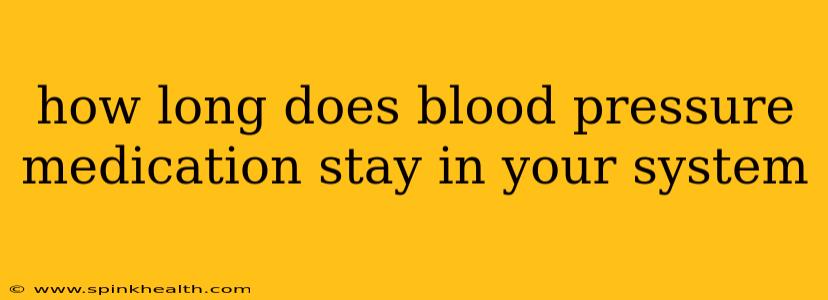The question of how long blood pressure medication stays in your system isn't a simple one with a single answer. It's a journey, a story really, that unfolds differently depending on the specific medication, the dosage, your individual metabolism, and even your liver and kidney function. Think of your body as a complex river system, and the medication as a dye being introduced – how long the color remains visible depends on many factors influencing the flow.
Let's dive into the details, exploring the variables that dictate how long these vital medications remain active within your body.
What Factors Determine How Long Blood Pressure Medication Remains in Your System?
Several crucial elements influence the duration of blood pressure medication in your system. This isn't just a matter of reading the label; it's a personalized equation:
-
The Specific Medication: Different blood pressure medications have different half-lives. A half-life is the time it takes for half the medication to be eliminated from your bloodstream. Some medications are metabolized and eliminated quickly, while others linger longer. This is determined by the medication's chemical properties and how your body processes it.
-
Dosage: A higher dose generally means the medication will remain detectable in your system for a longer period. It's like adding more dye to the river – it takes longer to dilute.
-
Individual Metabolism: This is where things get truly unique. Your body's metabolic rate dictates how efficiently it processes and eliminates drugs. Faster metabolism means quicker elimination, while slower metabolism can result in prolonged presence of the medication.
-
Liver and Kidney Function: These organs are crucial for filtering and eliminating waste products, including medications. If liver or kidney function is impaired, the medication will remain in your system longer. Think of it like a dam slowing the river's flow.
-
Age: Older individuals often have slower metabolisms and potentially impaired kidney or liver function, leading to a longer duration of medication in their systems.
-
Other Medications: Interactions between different medications can affect how quickly your body processes blood pressure medication, potentially prolonging or shortening its presence.
How Long Does it Typically Stay Detectable?
While precise timelines are impossible to provide without knowing the specific medication and individual factors, most blood pressure medications are designed to have a relatively consistent therapeutic effect throughout the day. However, traces of the medication can often be detected in blood or urine tests for days, or even weeks, after the last dose, depending on the factors above. This doesn't mean the medication is actively controlling your blood pressure at that point, but simply that measurable remnants may be present.
What Happens If I Miss a Dose?
Missing a dose can disrupt the consistent therapeutic effect of the medication. While a single missed dose is rarely a major concern, consistently missing doses can lead to elevated blood pressure and potentially worsen your condition. Always consult your doctor or pharmacist if you have questions about your medication regimen.
Can Blood Pressure Medication Be Detected in Drug Tests?
Yes, some blood pressure medications can be detected in drug tests, although this isn't typically the primary focus of such tests. The detection window varies greatly depending on the medication and the testing method.
Is There a Way to Speed Up Elimination?
There is no reliable way to significantly accelerate the elimination of blood pressure medication from your system. Your body processes medications at its own pace. Focusing on healthy habits like proper hydration and maintaining a healthy diet can support your overall health and liver/kidney function, but won't drastically speed up the elimination process.
What Should I Do If I Have Concerns?
If you have any concerns about your blood pressure medication, including its duration in your system or potential side effects, it's crucial to contact your doctor or pharmacist immediately. They can provide personalized advice based on your specific circumstances and medication. Never adjust your dosage or stop taking your medication without consulting your healthcare provider.
This information is for general knowledge and does not constitute medical advice. Always consult a healthcare professional for any concerns related to your health or medication.

